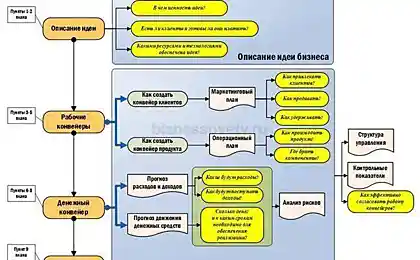709
Tell me what you did today, and I'll tell you who you are
There is no tomorrow, if you haven't done anything today
"Happiness is when what you think, say and do is in harmony". Mahatma Gandhi
Gandhi was absolutely right. When you act contrary to your values and goals, there is internal conflict. You know exactly what to do at the moment is to work on the project, to be around family, eat right or to do something else, but deliberately moving in the opposite direction.
Like me, you can convince yourself that closer to our dream, but an honest look at things will reveal that you are only fooled.

Your results is a direct consequence of your behaviour. And when you deliberately sabotaging your attempts to achieve something, you can't feel confident. On the contrary, you may be faced with depression and inner turmoil.
How close to your goals and values do you live?
How your condition balanced?
There is no other way. If you want to be successful, you should behave accordingly. Aristotle said: "We are what we do systematically."
We live life segments in 24 hours.We all have 24 hours in a day. If your day was not complete, and life will not. However, once he coped with everything, you will inevitably succeed.
How was your day today?
Seriously.
Take a look at everything you have done today. If you acted like he lived for this day the person you aspire to be?
If you're live each day in the course of the year as well as today, what will you achieve this year?
If you truly intend to achieve your goals, what should you change today?
How to look like your average day that you reached the goal?
The best way to consciously model the life of your dreams is to start with a perfect day. What it should be?
What needs to happen daily, so you can live exactly as you want? Probably, at this point you already are in some cases out pictures of your perfect day, but how they bring you closer to the desired result?
Your perfect day should be based on your own understanding of the desired life. You're the only one who can determine your happiness and success.
My perfect day includes the following items:
· 7-8 hours of healthy and deep sleep.
· conscious consumption of food (healthy and simple). The amount of harmful foods should be less than 300 calories a day diet. And at least one meal a day I spend with my wife and children.
· Take 30-60 minutes exercise.
· 15-30 minutes to devote to prayer and meditation.
· 1-2 hours — informed study of the subject.
· 3-5 hours without any distractions I dedicate to writing (not including e-mail, unless I write specifically to someone).
· 2+ hours of play with children (and no smartphones)
· 1+ hour one-on-one with his wife (no smartphones).
It does not matter in which order I perform these steps. Since one day is never like another. If I do all of the above will remain for another 3 hours to check emails, meals, driving, spontaneous acts, distraction, phone conversations with friends and things that happen during the day.
Of course, not all my days are that I have identified above. Only about half of them corresponds to a list, and the other half is a simplified version.
We all control how we use our time. If you think otherwise, then most likely you are prone to locus of control (e.g. have a "victim mentality") and will remain in the previous state until we decide to take responsibility for their actions.
What to do:
Take a few minutes to imagine your ideal day.
Make a list of which it is composed.
Start tracking how you live your days. Beginning to control your time and reaching consciousness, you realize the degree of inner imbalance.
I know it is far easier to say than to do. However, to live your days consciously and according to your goals is absolutely possible. As well as it is possible to replace bad habits with new. And certainly you can become the kind of person you want to be.
The theory of motivation and self-controlWhen you have clearly defined goals, internally motivated, have designated time frame, you can only move in a given direction.
If you lack motivation, then there are problems with your goal. Or you picked the wrong target, did not specify it, or the time frame identified is not true (Read Parkinson's Law).
Here's how the right goals to work on a psychological level:
According to research, self-control is a psychological process that pinpoints the contradiction between our tasks and our behavior. A volley of motivation is the force that helps us get from where we are now to what we want to achieve.
Self-control works in three ways:
Monitoring: determines how well we currently perform work
Evaluation: determines how productively we work about our goals.
Response: defines what we think and feel in relation to the objectives. If we are not satisfied with their progress, respond to pushes otherwise distribute the available resources.
To not only achieve their goals but far surpass the established framework, apply more effort than seems necessary.Most people underestimate the amount of effort required to achieve the goal.
Do not wait for perfect conditions, get ready for the troubles and obstacles. To overestimate the required amount of time and effort is much better than to underestimate them.

The implementation of intentionsof Course, achieving goals is not an easy task. If this were so, then everyone would be successful. Often people do not reach their goals because of problems with self-control.
A huge amount of research looking for the answer to the question: "How to support people on the path to their goal, if they start to lose motivation?"
The answer is what psychologists call "implementation intentions." This method is often used by athletes. For example, ultramarafon runner, preparing for a debilitating head-to-head determines the conditions under which he would go the distance (for example, if I completely lose all sense of orientation, then stops).
If you do not specify the conditions under which will go the distance, you'll give up prematurely. According to most of the people stop, with another 40 percent capacity.
However, the theory of implementation intentions has gone even further.
You not only need to know under what conditions you can stop. You also need to define the behavior-oriented performance objectives when you face negative circumstances.
My cousin Jesse is a great example. For decades he was a heavy smoker, Smoking several packs a day. Three years ago he left.
Now that he is experiencing stress or is faced with other circumstances, encourage them to smoke a cigarette, he says to himself: "If I were still a smoker, it is one of those moments where I reached for a cigarette." And then continue your day in the usual way.
When I get distracted, which happens quite often, I take out my Notepad and begin to rewrite your goals. It re-awakens in me the passion and motivation is to correct actions.
You can't just want to succeed. You need to be prepared for the worst.
You will often veer off course. You need to prepare for such moments, when the motivation is not all. Training is achieved by creating triggers that will restart your motivation.
What to do: Examine barriers that can be encountered on your way to the target (e.g., you decided to give up sweets and at the party, serve your favorite dessert). What will be your reaction?
Imagine all the obstacles that they can come to you. And then think of each such answer, which will bring you to your destination. This way you will be ready for war. In the words of Richard Marcinko: "the more you sweat in training the less you bleed in battle".
When you encounter an obstacle, take proactive measures.
In conclusion:How was your day? And what about yesterday?
There is no tomorrow, if you haven't done anything today.
How you spend today is a clear indicator of who you are and who you will become.
It is not enough just to want a better future. You should clearly know how it should look like this is the future, and begin to live it today.
Winners behave like winners before they start to win. If you are acting like a winner today, you become tomorrow. published
Author: Benjamin P. Hardy, translation Lera Petrosyan
P. S. And remember, just changing your mind — together we change the world! © econet
Source: interesno.co/myself/a104c7d7d277
"Happiness is when what you think, say and do is in harmony". Mahatma Gandhi
Gandhi was absolutely right. When you act contrary to your values and goals, there is internal conflict. You know exactly what to do at the moment is to work on the project, to be around family, eat right or to do something else, but deliberately moving in the opposite direction.
Like me, you can convince yourself that closer to our dream, but an honest look at things will reveal that you are only fooled.

Your results is a direct consequence of your behaviour. And when you deliberately sabotaging your attempts to achieve something, you can't feel confident. On the contrary, you may be faced with depression and inner turmoil.
How close to your goals and values do you live?
How your condition balanced?
- Personally, I constantly catch myself checking Facebook and Twitter, knowing that it's distracting me from my work.
- I can't give up homemade bread my wife with Nutella, knowing that I will not achieve six pack abs.
- Often for days I did not write, although I know that every day of inaction could cost me an additional month of work in achieving the goal.
There is no other way. If you want to be successful, you should behave accordingly. Aristotle said: "We are what we do systematically."
We live life segments in 24 hours.We all have 24 hours in a day. If your day was not complete, and life will not. However, once he coped with everything, you will inevitably succeed.
How was your day today?
Seriously.
Take a look at everything you have done today. If you acted like he lived for this day the person you aspire to be?
If you're live each day in the course of the year as well as today, what will you achieve this year?
If you truly intend to achieve your goals, what should you change today?
How to look like your average day that you reached the goal?
The best way to consciously model the life of your dreams is to start with a perfect day. What it should be?
What needs to happen daily, so you can live exactly as you want? Probably, at this point you already are in some cases out pictures of your perfect day, but how they bring you closer to the desired result?
Your perfect day should be based on your own understanding of the desired life. You're the only one who can determine your happiness and success.
My perfect day includes the following items:
· 7-8 hours of healthy and deep sleep.
· conscious consumption of food (healthy and simple). The amount of harmful foods should be less than 300 calories a day diet. And at least one meal a day I spend with my wife and children.
· Take 30-60 minutes exercise.
· 15-30 minutes to devote to prayer and meditation.
· 1-2 hours — informed study of the subject.
· 3-5 hours without any distractions I dedicate to writing (not including e-mail, unless I write specifically to someone).
· 2+ hours of play with children (and no smartphones)
· 1+ hour one-on-one with his wife (no smartphones).
It does not matter in which order I perform these steps. Since one day is never like another. If I do all of the above will remain for another 3 hours to check emails, meals, driving, spontaneous acts, distraction, phone conversations with friends and things that happen during the day.
Of course, not all my days are that I have identified above. Only about half of them corresponds to a list, and the other half is a simplified version.
We all control how we use our time. If you think otherwise, then most likely you are prone to locus of control (e.g. have a "victim mentality") and will remain in the previous state until we decide to take responsibility for their actions.
- What's your ideal day?
- How often do you live your perfect day?
What to do:
Take a few minutes to imagine your ideal day.
Make a list of which it is composed.
Start tracking how you live your days. Beginning to control your time and reaching consciousness, you realize the degree of inner imbalance.
I know it is far easier to say than to do. However, to live your days consciously and according to your goals is absolutely possible. As well as it is possible to replace bad habits with new. And certainly you can become the kind of person you want to be.
The theory of motivation and self-controlWhen you have clearly defined goals, internally motivated, have designated time frame, you can only move in a given direction.
If you lack motivation, then there are problems with your goal. Or you picked the wrong target, did not specify it, or the time frame identified is not true (Read Parkinson's Law).
Here's how the right goals to work on a psychological level:
According to research, self-control is a psychological process that pinpoints the contradiction between our tasks and our behavior. A volley of motivation is the force that helps us get from where we are now to what we want to achieve.
Self-control works in three ways:
Monitoring: determines how well we currently perform work
Evaluation: determines how productively we work about our goals.
Response: defines what we think and feel in relation to the objectives. If we are not satisfied with their progress, respond to pushes otherwise distribute the available resources.
To not only achieve their goals but far surpass the established framework, apply more effort than seems necessary.Most people underestimate the amount of effort required to achieve the goal.
Do not wait for perfect conditions, get ready for the troubles and obstacles. To overestimate the required amount of time and effort is much better than to underestimate them.

The implementation of intentionsof Course, achieving goals is not an easy task. If this were so, then everyone would be successful. Often people do not reach their goals because of problems with self-control.
A huge amount of research looking for the answer to the question: "How to support people on the path to their goal, if they start to lose motivation?"
The answer is what psychologists call "implementation intentions." This method is often used by athletes. For example, ultramarafon runner, preparing for a debilitating head-to-head determines the conditions under which he would go the distance (for example, if I completely lose all sense of orientation, then stops).
If you do not specify the conditions under which will go the distance, you'll give up prematurely. According to most of the people stop, with another 40 percent capacity.
However, the theory of implementation intentions has gone even further.
You not only need to know under what conditions you can stop. You also need to define the behavior-oriented performance objectives when you face negative circumstances.
My cousin Jesse is a great example. For decades he was a heavy smoker, Smoking several packs a day. Three years ago he left.
Now that he is experiencing stress or is faced with other circumstances, encourage them to smoke a cigarette, he says to himself: "If I were still a smoker, it is one of those moments where I reached for a cigarette." And then continue your day in the usual way.
When I get distracted, which happens quite often, I take out my Notepad and begin to rewrite your goals. It re-awakens in me the passion and motivation is to correct actions.
You can't just want to succeed. You need to be prepared for the worst.
You will often veer off course. You need to prepare for such moments, when the motivation is not all. Training is achieved by creating triggers that will restart your motivation.
What to do: Examine barriers that can be encountered on your way to the target (e.g., you decided to give up sweets and at the party, serve your favorite dessert). What will be your reaction?
Imagine all the obstacles that they can come to you. And then think of each such answer, which will bring you to your destination. This way you will be ready for war. In the words of Richard Marcinko: "the more you sweat in training the less you bleed in battle".
When you encounter an obstacle, take proactive measures.
In conclusion:How was your day? And what about yesterday?
There is no tomorrow, if you haven't done anything today.
How you spend today is a clear indicator of who you are and who you will become.
It is not enough just to want a better future. You should clearly know how it should look like this is the future, and begin to live it today.
Winners behave like winners before they start to win. If you are acting like a winner today, you become tomorrow. published
Author: Benjamin P. Hardy, translation Lera Petrosyan
P. S. And remember, just changing your mind — together we change the world! © econet
Source: interesno.co/myself/a104c7d7d277























